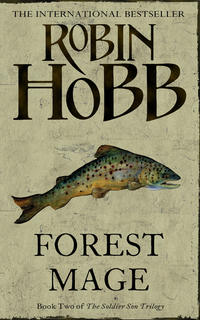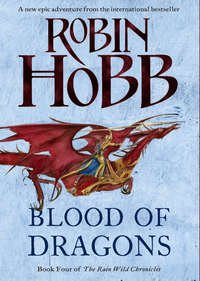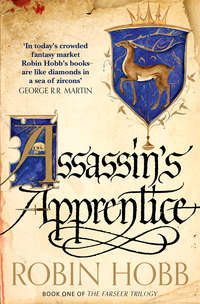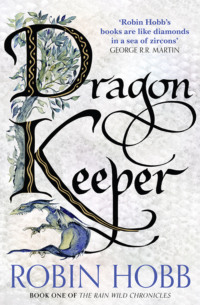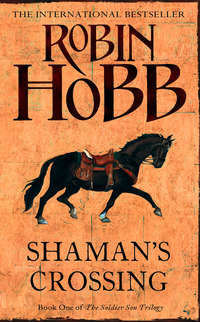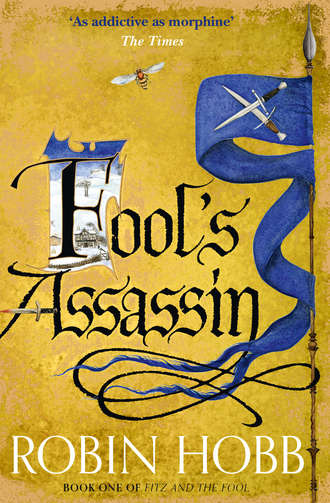
Полная версия
Fool’s Assassin
Less well known is that women may become more prone to fits of melancholy, anger or foolish impulses. In a vain grasping at lost youth, even the steadiest of women can give way to fripperies and wasteful practices. Usually these storms pass in less than a year, and the woman will resume her dignity and calm as she accepts her own ageing.
Sometimes, however, these symptoms can precede the downfall of her mind. If she becomes forgetful, calling people by the wrong names, leaving ordinary tasks incomplete and, in extreme cases, losing recognition of her own family members, then her family must recognize that she can no longer be considered reliable. Small children should not be entrusted to her care. Forgotten cooking may lead to a kitchen blaze, or the livestock left unwatered and unfed on a hot day. Remonstrances and rebukes will not change these behaviours. Pity is a more appropriate response than anger.
Let such a woman be given work that is of less consequence. Let her sit by the fire and wind wool or do some such task that will endanger no one else. Soon enough, the body’s decline will follow the mind’s absence. The family will experience less grief at her death if she has been treated with patience and kindness during her decline.
If she becomes exceedingly troublesome, opening doors in the night, wandering off in rainstorms or exhibiting flashes of fury when she can no longer comprehend her surroundings, then administer to her a strong tea of valerian, one that puts her into a manageable state. This remedy may bring peace both to the old woman and to the family weary of caretaking for her.
On the Ageing of the Flesh, Healer Molingal
Molly’s madness was all the harder to bear in that she remained so pragmatic and sensible in all other parts of her life.
Molly’s courses had stopped flowing early in our marriage. She had told me then that she would not ever conceive again. I had tried to comfort her and myself, pointing out that we had a daughter we shared, even if I had missed her childhood. It was foolish to ask more of fate than what we’d been gifted with already. I told her that I accepted there would be no last child for us, and I truly thought she had accepted it as well. We had a full and comfortable life at Withywoods. Hardships that had complicated her early life were a thing of the past, and I had separated myself from politics and machinations of the court at Buckkeep Castle. We finally had time enough for each other. We could entertain travelling minstrels, afford whatever we desired, and celebrate the passing holidays as lavishly as we wished. We went out riding together, surveying the flocks of sheep, the blossoming orchard, the hayfields and the vineyards in idle pleasure at such a serene landscape. We returned when we were weary, dined as we would, and slept late when it pleased us.
Our house steward, Revel, had become so competent as to make me nearly irrelevant. Riddle had chosen him well, even if he had never become the door soldier that Riddle had hoped for. The steward met weekly with Molly to talk of meals and supplies, and he worried me as often as he dared with lists of things he thought needed repairing or updating or, I swear to Eda, changed simply because the man delighted in change. I listened to him, allocated funds and left it mostly in his capable hands. The estates generated enough income to more than compensate for their upkeep. Still, I watched the accounts carefully and set aside as much as I could for Nettle’s future needs. Several times she rebuked me for spending my own funds on repairs the estate could have paid for. But the crown had allocated me a generous allotment in return for my years of service to Prince Dutiful. Truly, we had plenty and to spare. I had believed that we were in the quiet backwater of our days, a time of peace for both of us. Molly’s collapse at that Winterfest had alarmed me, but I had refused to accept that it was a foreshadowing of what was to come.
In the year after Patience died, Molly grew more pensive. She often seemed distracted and absent-minded. Twice she had dizzy spells, and once she spent three days in bed before she felt fully recovered. She lost flesh and slowed down. When the last of her sons decided it was time to make their own ways in the world, she let them go with a smile for them, and quiet tears with me in the evening. ‘I am happy, for them. This is their beginning time. But for me, it is an ending, and a difficult one.’ She began to spend more time at quiet pursuits, was very thoughtful of me, and showed more of her gentle side than she had in previous years.
The next year, she recovered a bit. When spring came, she cleaned out the beehives she had neglected, and even went out and captured a new swarm. Her grown children came and went, always full of news of their busy lives, bringing her grandchildren to visit. They were happy to see that their mother had recaptured some of her old energy and spirit. Desire came back to her, to my delight. It was a good year for both of us. I dared to hope that whatever had caused her fainting spells was past. We grew closer, as two trees planted apart from one another finally find that their branches reach and intertwine. It was not that her children had been a barrier between us so much as how she had always given her first thought and time to them. I will shamelessly admit that I enjoyed becoming the centre of her world, and did all I could to show her, in every way, that she had always held that place in my life.
More recently, she had begun to put on flesh again. Her appetite seemed endless and as her belly rounded out, I teased her a bit. I stopped the day she looked at me and said, almost sadly, ‘I cannot be ageless as you seem to be, my love. I will grow older and fatter perhaps, and slower. My years of being a girl are long gone, as are my years of childbearing. I am become an old woman, Fitz. I only hope that my body gives out before my mind. I have no desire to linger on past a time when I don’t recall who you are or I am.’
So when she announced her ‘pregnancy’ to me, I began to fear that her worst fears and mine were coming true. She grew heavier in the belly. Her back ached and she walked more slowly. Her thoughts grew distant from our daily life, she neglected the tasks she had once enjoyed, and often I found her staring off into the distance, perplexed and yet wondering.
When a few weeks had passed and she persisted in believing she was pregnant, I tried again to make her see reason. We had retired to our bed, and she was in my arms. She had spoken, again, of a child to come. ‘Molly. How can this be so? You told me yourself …’
And with a flash of her old temper, she lifted her hand and covered my mouth. ‘I know what I said. And now I know something different. Fitz, I’m carrying your child. I know how strange that must seem to you, for I myself find it more than passing strange. But for months I’ve suspected it, and I kept silent, not wanting you to think me foolish. But it’s true. I felt the baby move inside me. For as many children as I’ve had, it’s not a thing I would mistake. I’m going to have a baby.’
‘Molly,’ I said. I still held her, but I wondered if she was truly with me. I could think of nothing more to say to her. Coward that I am, I did not challenge her. But she sensed my doubt. I felt her stiffen in my arms and I thought she would thrust herself away from me.
But then I felt her anger die. She eased out the deep breath she had taken to rebuke me, leaned her head against my shoulder and spoke. ‘You think I’m mad, and I suppose I can hardly blame you. For years, I thought I was a dried-up husk, never to bear again. I did my best to accept it. But I’m not. This is the baby we’ve hoped for, our baby, yours and mine, to rear together. And I don’t really care how it’s happened, or if you think I’m mad right now. Because, soon enough, when the child is born, you will know that I was right. And until then, you may think me as mad or as feeble-minded as you please, but I intend to be happy.’
She relaxed in my arms and in the darkness I saw her smile at me. I tried to smile back. She spoke gently as she settled back into the bed beside me. ‘You’ve always been such a stubborn man; always sure that you know what is really happening far better than anyone else. And perhaps, a time or two, that has been true. But this is woman’s knowing that I’m talking about now, and in this, I know better than you do.’
I tried a last time. ‘When you want a thing so badly for so long, and then it comes time to face that you cannot have it, sometimes—’
‘Sometimes you can’t believe it when it comes to you. Sometimes you’re afraid to believe it. I understand your hesitation.’ She smiled into the darkness, pleased at turning my own words against me.
‘Sometimes wanting what you can’t have can turn your mind,’ I said hoarsely, for I felt compelled to say the terrible words aloud.
She sighed a little sigh, but she smiled as she did so. ‘Loving you should have turned my mind long ago, then. But it didn’t. So, you can be as stubborn as you want. You can even think me mad. But this is what is true. I’m going to have your baby, Fitz. Before winter ends, there’s going to be a baby in this house. So tomorrow you had best have the servants bring the cradle down out of the attic. I want to arrange his room before I get too heavy.’
And so Molly stayed in my home and my bed, and yet she left me, departing on a path where I could not follow her.
The very next day, she announced her condition to several of the maid-servants. She ordered the Sparrow Chamber transformed into a nursery and parlour for herself and her imaginary child. I did not contradict her, but I saw the faces of the women as they left the room. Later, I saw two of them, heads together and tongues clucking. But when they looked up and saw me, they stilled their talk and earnestly wished me good day, never meeting my eyes.
Molly pursued her illusion with energy I thought long lost to her. She made small gowns and little bonnets. She supervised the cleaning of the Sparrow Chamber from top to bottom. The chimney was freshly swept and new draperies ordered for the windows. She insisted that I Skill the news to Nettle, and ask her to come and spend the dark months of winter with us, to help us welcome our child.
And so Nettle came, even though in our Skill-discussions we had agreed that Molly was deceiving herself. She celebrated Winterfest with us, and stayed until the snow started to slump and the bare paths to show. No baby arrived. I thought Molly would be forced to admit her delusion then, but she steadfastly insisted that she had but been mistaken as to how pregnant she was.
Spring came into full blossom. In the evenings we spent together she would sometimes drop her needlework and exclaim, ‘Here! Here, he’s moving, come feel!’ But every time I obediently set my hand to her belly, I felt nothing. ‘He’s stopped,’ she would insist, and I would nod gravely. What else could I do?
‘Summer will bring him,’ she assured us both, and the little garments she crocheted now were light rather than warm and woolly. As the hot days of summer ticked by to the chirping of grasshoppers, they became another layer of garments in the chest of clothing she had made for her imaginary child.
Autumn went out in a blaze of glory. Withywoods was lovely as it ever was in fall, with scarlet sprays of alder and golden birch leaves like coins and thin yellow willow leaves in curls, drifting down for the wind to push into deep banks at the edges of the carefully-tended grounds. We no longer went out riding together, for Molly insisted she might lose the child if she did so, but we went for walks. I gathered hickory nuts with her, and listened to her plan to move screens into her nursery to make an enclosed area for the cradle. As the days passed, the river that threaded the valley grew swift with rain. Snow arrived and Molly knit warmer things for our phantom baby, sure now that it would be a winter child, in need of soft blankets and woolly boots and caps. And just as the ice covered and hid the river, so did I strive to conceal from her the growing despair I felt.
But I am sure she knew it.
She had courage. Against the current of doubt that all others pressed her way, she swam. She was aware of the talk of the servants. They thought her daft or senile, and wondered that so sensible a woman as she had been could so foolishly assemble a nursery for an imaginary child. She kept her dignity and restraint before them and by that forced them to treat her with respect. But she also withdrew from them. Once she had socialized with the local gentry. Now she planned no dinners and never went out to the crossroads market. She asked no one to weave or sew for her baby.
Her imaginary child consumed her. She had little time for me or the other things that had once interested her. She spent her evenings and sometimes her nights in her nursery-parlour. I missed her in my bed but did not press her to climb the stairs and join me there. Sometimes of an evening, I would join her in her cosy room, bringing whatever translation I was working on. She always welcomed me. Tavia would bring us a tray with cups and herbs, and set a kettle to boil on the hearth and leave us to our own devices. Molly would sit in a cushioned chair, her swollen feet propped up on a small hassock. I had a small table in the corner for my work, and Molly kept her hands busy with knitting or tatting. Sometimes I would hear the ticking of her needles cease. Then I would look up and see her staring into the fire, her hands on her belly and her face wistful. At such times I longed with all my heart that her self-deception were true. Despite our ages, I thought she and I could manage an infant. I even asked her, once, what she thought of us taking in a foundling. She sighed softly and said, ‘Be patient, Fitz. Your child grows within me.’ So I said no more of it to her. I told myself her fancy brought her happiness, and truly, what harm did it do? I let her go.
In high summer of that year, I received the news that King Eyod of the Mountains had died. It was not unexpected but it created a delicate situation. Kettricken, the former Queen of the Six Duchies, was Eyod’s heir and her son King Dutiful in line after her. Some in the Mountains would hope that she would return to them, to reign there, even though she had often and clearly stated that she expected her son Dutiful to bring the Mountains under his rule as a sort of seventh duchy in our monarchy. Eyod’s death marked a transition that the Six Duchies must observe with gravity and respect. Kettricken would of course travel there, but also King Dutiful and Queen Elliania, the princes Prosper and Integrity, Skillmistress Nettle and several of the coterie, Lord Chade, Lord Civil … the list of those who must attend seemed endless, and many minor nobles attached themselves to the party as a way to curry favour. And my name was appended to it. Go I must, as Holder Badgerlock, a minor officer in Kettricken’s guard. Chade insisted, Kettricken requested, Dutiful all but ordered me, and Nettle pleaded. I packed my kit and chose a mount.
Over the year, Molly’s obsession had ground me down to a weary acceptance. I was not surprised when she declined to accompany me as she felt her ‘time was very close now’. A part of me did not wish to leave her when her mind was so unsettled, and another part of me longed for a respite from indulging her delusion. I called Revel aside and asked that he pay special attention to her requests while I was gone. He looked almost offended that I thought such a command necessary. ‘As ever, sir,’ he said, and added his stiff little bow that meant, ‘you idiot.’
And so I left her and rode away from Withywoods alone and quietly joined the procession of noble folk from the Six Duchies going north to the Mountains for the funeral rites. It was passing strange for me to relive a journey I had once made when I was not yet twenty, and had travelled to the Mountain Kingdom to claim Kettricken as bride for King-in-Waiting Verity. In my second journey to the Mountains, I had often avoided the roads and travelled cross-country with my wolf.
I had known that Buck had changed. Now I saw that the changes had happened all through the Six Duchies. The roads were wider than I recalled, and the lands more settled. Fields of grain grew where there had once been open pasturage. Towns sprawled along the road, so that sometimes it seemed one scarcely ended before the next began. There were more inns and towns along the way, though the size of our party sometimes overwhelmed the accommodations. The wild lands were being tamed, brought under the plough and fenced for pasture. I wondered where the wolves hunted now.
As one of Kettricken’s guardsmen, clad in her white and purple, I rode close to the royal party. Kettricken had never been one to stand upon formality, and her request that I ride at her stirrup was simply accepted by those who knew her. We spoke quietly, the jingling and clopping of the other travellers granting us a strange privacy. I told her stories of my first journey to the Mountains. She spoke of her childhood and of Eyod, not as king but as her loving father. I said nothing of Molly’s disorder to Kettricken. Her sorrow at the death of her father was enough for her to bear.
My position as a member of her guard meant that I was accommodated at the same inns where Kettricken stayed. Often that meant that Nettle was there as well, and sometimes we were able to find a quiet place and time for conversation. It was good to see her and a relief to discuss frankly with her how her mother’s illusion persisted. When Steady joined us, we were not as blunt, but that was Nettle’s choice of reticence. I could not decide if she thought her younger brother was too young for such tidings or if she thought it too much of a woman’s matter. Burrich had named his son well. Of all his boys, Steady wore most of Burrich’s features and his sturdy build, and shared too his deliberate way of moving and unflinching values for both honour and duty. When he was with us, it was as if his father sat at the table. I marked Nettle’s easy dependence on her brother’s strength, and not just for the Skill. I was glad he was so often at her side, and yet wistful. I wished he could have been my son, even as I was glad to see his father live on in him. I think he sensed how I felt. He was deferential to me, and yet there were times when his black eyes bore into mine as if he could see my soul. And at those times, I missed Burrich with a cutting sorrow.
In more private times, Nettle shared with me her mother’s monthly letters detailing the progress of a pregnancy that had now seemingly stretched over two years. It broke my heart to hear Molly’s words as Nettle read aloud of her mulling of names, and progress on her sewing projects for a baby that would never exist. Yet neither one of us had any solution other than to take a small comfort in the sharing of our worry.
When we arrived in the Mountains, we were given a warm welcome. The bright structures that made up Jhaampe, the Mountain capital, still reminded me of the bells of flowers. The older structures were as I recalled them, incorporating the trees they were built among. But even to the Mountains change had come, and the outskirts of that city were more like the towns of Farrow and Tilth, buildings of stone and plank. It made me sad for I felt that the change was not a good one, as if such structures were a canker growing over the forest.
For three days we mourned a king whom I had respected deeply, not with wild wailing and oceans of tears, but with quietly shared stories of who he had been and how well he had ruled. His people grieved for their fallen king but in equal measure they welcomed his daughter home. They were happy to see King Dutiful and the Narcheska and the two princes. Several times I heard people mention with quiet pride that young Integrity greatly resembled Kettricken’s brother and his late uncle, Prince Rurisk. I had not seen that resemblance until I heard it spoken, and then I could not forget it.
At the end of the time of mourning, Kettricken stood before them and reminded them that her father and King-in-Waiting Chivalry had begun the process of peace between the Six Duchies and the Mountains. She spoke of how wisely they had secured that peace with her marriage to Verity. She asked that they look at her son King Dutiful as their future monarch and recall that the peace they now enjoyed should be viewed as King Eyod’s greatest triumph.
With the formalities of King Eyod’s funeral over, the true work of the visit commenced. Daily there were meetings with Eyod’s advisors, and there were lengthy discussions on the orderly handing over of the governance of the Mountains. I was present for some of it, sometimes standing at the side of the room, as Chade and Dutiful’s extra eyes and ears, and sometimes sitting outside in the sun, my eyes closed but Skill-linked to both of them in the higher-level meetings. But in the evenings, I was sometimes released to have time on my own.
And so it was that I found myself standing outside an elaborately carved and painted door, looking wistfully at the work of the Fool’s hands. Here was the house where he had lived when he thought he had failed to fulfil his fate as the White Prophet. On the night King Shrewd had died, Kettricken had fled Buckkeep and the Fool had gone with her. Together they had made the arduous journey to the Mountain Kingdom where she believed she and her unborn child would be safe in her father’s home. But there fate had dealt the Fool two blows. Kettricken’s child did not live, and news of my death in Regal’s dungeons reached him. He had failed in his quest to ensure there was an heir to the Farseer line. He had failed in his quest to bring about his prophecy. His life as a White Prophet was over.
When he believed me dead, he had stayed in the Mountains with Kettricken, lived in this small house and tried to make a little life for himself as a wood carver and toy maker. Then he had found me, broken and dying, and brought me here to the dwelling he shared with Jofron. When he took me in, she had moved out. When I was recovered, the Fool and I accompanied Kettricken on a hopeless quest to follow her husband’s cold trail into the mountains. The Fool had left the little house and all his tools for Jofron. By the colourfully-painted marionettes dangling in the window, I suspected she still lived there and still made toys.
I did not knock on the door but stood in the long summer evening and studied the carved imps and pecksies that frolicked on the trim of the shutters. Like many of the old-fashioned Mountain dwellings, this structure was painted with bright colours and details as if it were a child’s treasure box. An emptied treasure box, my friend long gone from it.
The door opened and yellow lamplight spilled out. A tall, pale lad of about fifteen, fair hair falling to his shoulders, stood framed there. ‘Stranger, if you seek shelter, you need but knock and ask. You are in the Mountains now.’ He smiled as he spoke and opened wide the door, stepping aside to gesture me in.
I walked slowly toward him. His features were vaguely familiar. ‘Does Jofron still live here?’
His smiled widened. ‘Lives and works. Grandmother, you have a visitor!’
I moved slowly into the room. She sat at a workbench by the window, a lamp at her elbow. She was painting something with a small brush, even strokes of goldenrod yellow. ‘A moment,’ she begged without looking up from her task. ‘If I let this dry between strokes, the colour will be uneven.’
I said nothing but stood and waited. Jofron’s long blonde hair was streaked with silver now. Four braids trapped it away from her face. The cuffs of a brightly-embroidered blouse were folded back to her elbows. Her arms were sinewy and flecked with paint, yellow, blue and a pale green. It was much longer than a moment before she set down her brush and leaned back and turned to me. Her eyes were just as blue as I recalled them. She smiled easily at me. ‘Welcome, guest. A Buckman, by the look of you. Come to honour our king’s final rest, I take it.’
‘That is true,’ I said.
When I spoke, recognition flickered and then caught fire in her eyes. She sighed and shook her head slowly. ‘You. His Catalyst. He stole my heart and lifted my spirit to search for wisdom. Then you came and stole him from me. As was right.’ She lifted a mottled cloth from her work desk and wiped vainly at her fingers. ‘I never thought to see you under this roof again.’ There was no enmity in her voice, but there was loss. Old loss.




